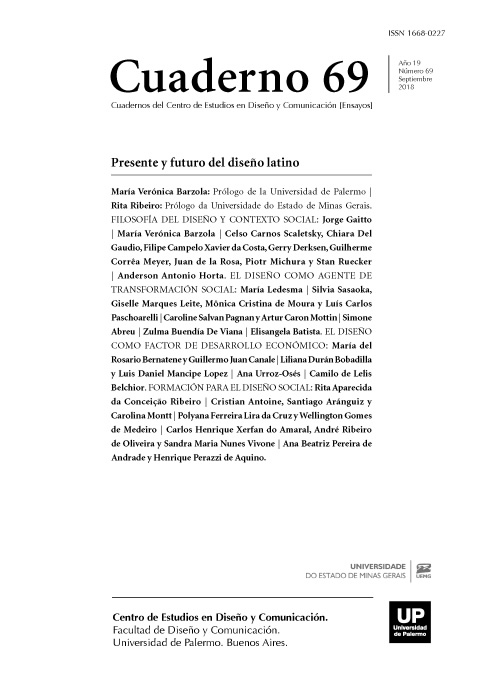El diseño como modelo de formación emprendedora en educación universitaria
Abstract
The entrepreneurship training in Brazil is still a secondary action in higher education institutions. The complexity of this training goes through diverse personal, cultural and technical characteristics. The developing of such skills during the training of a professional is a complex task, reinforced by the academic fragmentation of each specific field of activity.
Seeking to collaborate with a solution to this deficiency of the diversified and rigid curricula in the Brazilian educational model, this study sought to investigate in what way the design can contribute as an objective resource for the superior entrepreneurial formation. Therefore, the case study was carried out in a Brazilian higher education institution, with philanthropic characteristics, located in the region of Leopoldina, state of Rio de Janeiro.
References
Andrade, R. F. D. y Torkomian, A. L. V. (2001). Fatores de influência na estruturação de programas de educação empreendedora em instituições de ensino superior. Encontro de estudos sobre empreendedorismo e gestão de pequenas empresas, 2, 299-311
Baron, R. A. y Shane, S. A. (2010). Empreendedorismo-uma visão do processo. Cengage Learning Edições Ltda.
Bellotti, F.; Berta, R.; De Gloria, A.; Lavagnino, E.; Dagnino, F.; Ott, M. y Mayer, I. S. (2012). Designing a course for stimulating entrepreneurship in higher education through serious games. Procedia Computer Science, 15, 174-186. Bjögvinsson, E.; Ehn, P. e Hillgren, P. A. (2012). Design things and design thinking: Contemporary participatory design challenges. Design Issues, 28(3), 101-116.
Brown, T. (2008). Design thinking.Harvard business review, 86(6), 84. Disponible en: http://web.me.com/deatkins/CIC/Seminar_Schedule_files/HBR-Timbrown.pdfx
Cardoso, F. H. (1972). Empresário industrial e desenvolvimento econômico no Brasil (Vol. 13). Difusão Européia do livro. Denyer, D.; Tranfield, D. y Van Aken, J. E. (2008). Developing design propositions through research synthesis. Organization studies, 29(3), 393-413.
Dolabela, F. (2012). O segredo de Luísa: uma idéia, uma paixão e um plano de negócios: como nasce o empreendedor e se cria uma empresa. Sextante.
Dolabela, F. (2003). Pedagogia empreendedora: o ensino de empreendedorismo na educação básica, voltado para o desenvolvimento social sustentável. São Paulo: Cultura.
Dresch, A.; Lacerda, D. P. y Júnior, J. A. V. A. (2015). Design science research: método de pesquisa para avanço da ciência e tecnologia. Bookman Editora.
Jackson, A. (2014). Makers: The New Industrial Revolution.Journal of Design History, ept048.
Orford, J.; Wood, E.; Fisher, C.; Herrington, M. y Segal, N. (2003). Global entrepreneurship monitor. South African executive report.
Oosterbeek, H.; Van Praag, M. y Ijsselstein, A. (2010). The impact of entrepreneurship education on entrepreneurship skills and motivation. European economic review, 54(3), 442-454.
Osterwalder, A. y Pigneur, Y. (2010). Business model canvas. Self published. Last.
Paiva, V. (2001). Qualificação, crise do trabalho assalariado e exclusão social. A cidadania negada: políticas de exclusão na educação e no trabalho, 1, 49-64.
Ries, E. (2011). The lean startup: How today’s entrepreneurs use continuous innovation to create radically successful businesses. Crown Books.
Schumpeter, J. A. (1961). Teoria do desenvolvimento econômico. Fundo de Cultura.
Shane, S. A. (2009). Sobre Solo Fértil: Como identificar grandes oportunidades para empreendimentos em alta tecnologia. Bookman Editora.
Sennet, R. A. (2006). Cultura do novo capitalismo. Rio de Janeiro: Record.
Van Aken, J. E. (2005). Management research as a design science: articulating the research products of mode 2 knowledge production in management.British journal of management, 16(1), 19-36.
Los autores/as que publiquen en esta revista ceden los derechos de autor y de publicación a "Cuadernos del Centro de Estudios de Diseño y Comunicación", Aceptando el registro de su trabajo bajo una licencia de atribución de Creative Commons, que permite a terceros utilizar lo publicado siempre que de el crédito pertinente a los autores y a esta revista.


